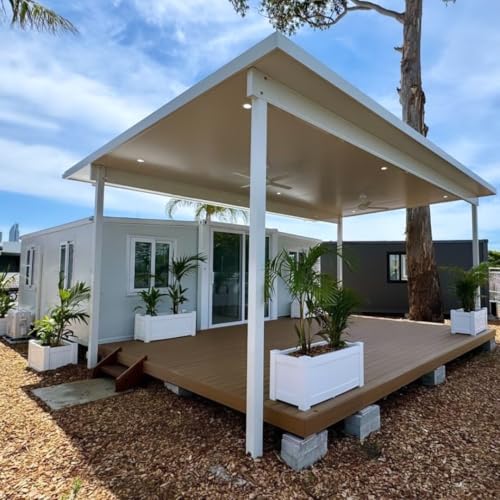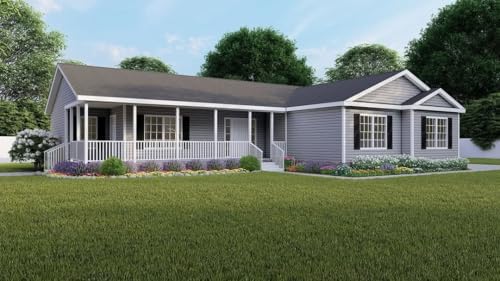Understanding Mobile Home Financing
Financing a mobile home in the USA differs significantly from obtaining a mortgage for a traditional site-built home. One essential distinction lies in the classification of the properties. Mobile homes, often referred to as manufactured homes, are typically considered personal property, while traditional homes are real property. This classification affects not only the type of loans available but also their terms and interest rates.
Many potential buyers harbor misconceptions regarding mobile home loans, assuming they function similarly to standard home mortgages. In reality, mobile home financing often involves personal loans, which can come with higher interest rates and shorter repayment terms. Borrowers may frequently face challenges in securing these loans due to the depreciation associated with mobile homes, unlike the appreciation that often occurs with traditional real estate investments.
It is important to recognize that financing options can be quite varied and may include chattel loans, which are specifically designed for personal property, and traditional mortgages tailored for manufactured homes affixed to land. Furthermore, some lenders may require a greater down payment and impose stricter credit requirements compared to conventional home loans. This makes it crucial for potential buyers to thoroughly research their options and find a lender who specializes in mobile home financing.
Moreover, the location and age of the mobile home can significantly influence financing opportunities. Lenders typically favor newer models situated in communities with amenities and good infrastructure. Understanding these factors can help buyers navigate the sometimes complex landscape of mobile home financing. By dispelling misconceptions and being informed about the available options, prospective mobile home purchasers can better prepare for the financing process and secure a satisfactory loan for their needs.
Types of Mobile Home Loans
When considering financing options for mobile homes, it is essential to understand the various types of loans available. Each type of mobile home loan serves different needs and has distinct requirements. Among the most common types are chattel loans, FHA loans, and personal loans. Understanding these options can help prospective buyers make informed decisions.
Chattel loans are specifically designed for mobile homes that are not permanently affixed to real estate. They allow buyers to finance the mobile home itself, rather than the land on which it resides. These loans often have shorter terms, typically ranging from 5 to 15 years, and may come with higher interest rates compared to traditional mortgages. One advantage of chattel loans is that they can be easier to qualify for, particularly for those who may not have excellent credit. However, they may also require a larger down payment and do not build equity in the land.
FHA loans, backed by the Federal Housing Administration, provide a more accessible financing option for those looking to purchase a mobile home on owned land. This type of loan typically requires a lower down payment, sometimes as low as 3.5%, and offers competitive interest rates. FHA loans are particularly beneficial for first-time homebuyers or those with lower credit scores. However, these loans come with specific requirements, such as the home needing to be newer and meet certain safety standards. Additionally, the mortgage insurance premiums can add to the overall cost.
Personal loans represent another option for financing mobile homes. These unsecured loans can be used to purchase a mobile home outright or to supplement another type of financing. They may be advantageous for buyers who do not want to put their homes at risk or those who are looking to borrow smaller amounts. However, personal loans typically have higher interest rates and shorter repayment periods, which can lead to higher monthly payments over time.
Factors Affecting Loan Approval
When seeking to finance a mobile home in the USA, various factors play a crucial role in determining loan approval. Lenders assess these factors to mitigate their risks associated with lending. Understanding these factors can significantly enhance an applicant’s chances of securing the necessary financing.
One of the primary considerations is the credit score of the borrower. A higher credit score typically reflects a responsible credit history, while a lower score may signal potential risks to lenders. Most mobile home financing options require a minimum credit score to qualify but specifics can vary from one lender to another. Prospective borrowers should routinely check their credit reports for inaccuracies and take steps to improve their scores prior to applying.
Income history is another vital aspect lenders evaluate when assessing loan applications. Borrowers must demonstrate a stable source of income, which indicates their ability to meet repayment obligations. Lenders may also assess the debt-to-income ratio; a lower ratio demonstrates better financial health. Individuals with inconsistent income may need to provide additional documentation to assure lenders of their financial stability.
Down payment requirements can vary significantly across lenders and can also affect loan approval. Generally, a larger down payment may ease the approval process while reducing overall loan costs. Lenders may favor applicants who can offer a higher percentage of the mobile home’s purchase price up front, as it decreases risk and demonstrates commitment to the investment.
Lastly, the age and condition of the mobile home itself are critical factors. Newer models often qualify for better financing terms, as they are usually deemed more valuable and easier to maintain. Older homes may face stricter scrutiny during the approval process. By understanding these key factors—credit score, income history, down payment, and the mobile home’s age—borrowers can better prepare themselves for a successful financing experience.
Hidden Costs of Mobile Home Financing
Financing a mobile home often presents a range of hidden costs that can significantly impact the total expense of ownership. While lenders may focus on the principal amount and interest rates, various ancillary fees can arise that buyers should be aware of before making a commitment.
One common hidden cost is the closing costs associated with mobile home financing. These costs typically include title search fees, attorney fees, appraisal fees, and any necessary inspection charges. Depending on the lender, these costs can accumulate to several thousand dollars, which can catch new homeowners by surprise if they do not budget accordingly.
Insurance is another crucial area where expenses may outweigh initial expectations. Mobile homes require specific types of insurance coverage, which can differ from standard homeowners’ policies. Factors such as location, age of the mobile home, and the value of personal belongings can contribute to varying insurance premiums, necessitating thorough research to secure the most economical option.
Furthermore, maintenance costs often emerge as a significant yet overlooked aspect of mobile home ownership. Regular upkeep is essential to preserve the mobile home’s condition and value. Buyers should be prepared for expenses related to roof repairs, plumbing issues, or general wear and tear, which can add up considerably over time.
Lastly, the choice between leasing land versus owning land can also influence the overall financial picture. Land leases may seem appealing due to lower upfront costs, yet they typically come with monthly rental payments that can escalate. In contrast, owning the land can provide stability and long-term investment potential, though it often entails a larger initial expenditure. Being aware of these hidden costs is vital for those considering mobile home financing, as comprehending the full spectrum of expenses ensures better preparation for total ownership costs.
Finding the Right Lender
Selecting the appropriate lender for mobile home financing is pivotal to achieving favorable loan terms and ultimately securing your investment. It is crucial to shop around and compare various lenders who specialize in mobile home loans. Not all lenders have the same experience or knowledge regarding mobile homes, which can significantly affect loan approvals, interest rates, and repayment terms.
Start by conducting thorough research on lenders that focus specifically on mobile home financing. These lenders will have a better understanding of the unique requirements and challenges associated with mobile homes, compared to traditional mortgage lenders. Utilize online resources to gather a list of reputable lenders and explore their specific loan offerings.
Once you have identified potential lenders, take the time to scrutinize their terms. Understanding the lender’s requirements for down payments, credit scores, and loan limits is vital. Some lenders may offer special programs targeted toward first-time mobile home buyers, which can be advantageous. Gather all relevant information regarding the financing terms, as this will allow you to make informed comparisons.
Interest rates are a significant component of mobile home financing, thus comparing rates from multiple lenders is essential. A small difference in interest rates can result in substantial savings over the life of the loan. Make sure to request and analyze quotes based on the same loan amount and term to ensure an accurate comparison.
Finally, checking borrower reviews can provide valuable insights into a lender’s reputation and customer service. Look for platforms where past clients have shared their experiences; this feedback can be instrumental in identifying a lender who is not only reliable but also supportive throughout the financing process. By taking these steps, you can better position yourself to find a reputable lender for your mobile home financing needs.
Common Myths about Mobile Home Financing
Mobile home financing is often plagued by misconceptions that can deter potential buyers from exploring their options fully. One prevalent myth is the belief that mobile homes are not eligible for traditional financing. In reality, many lenders have begun to recognize the value of manufactured homes and offer loans comparable to those for site-built houses. This shift reflects a growing acceptance of mobile homes in the housing market.
Another common misconception pertains to credit requirements. Many people assume that the credit score needed to finance a mobile home is substantially higher than that required for other forms of housing. However, certain lenders specialize in mobile home loans and offer financing opportunities with more lenient credit requirements. While a good credit score can enhance financing options, those with lower scores may still find competitive terms through the right lender.
Additionally, there exists a stigma surrounding mobile homes, often considered less desirable than traditional homes. This perception largely stems from outdated beliefs about the quality and stability of manufactured housing. However, modern mobile homes are constructed to rigorous safety standards and can be just as durable and aesthetically appealing as traditional homes. As a result, they provide an affordable housing solution that can appreciate over time, making them a worthy investment.
Lastly, some individuals believe that mobile home financing will invariably come with exorbitant interest rates. While it is true that rates can vary significantly based on the lender and borrower’s profile, numerous financing options exist with competitive rates. Understanding these myths can empower prospective buyers to make informed decisions and explore mobile home financing as a viable alternative to traditional housing.
Understanding Loan Terms and Conditions
When considering financing options for a mobile home in the USA, understanding the loan terms and conditions is paramount. These details govern the financial commitment you will undertake and can significantly influence your overall borrowing experience. One of the most important aspects to evaluate is the loan duration. Mobile home loans typically span a range of 15 to 30 years, and the length of the loan can impact your monthly payments and total interest paid over the life of the loan. Longer loan terms often result in lower monthly payments but can lead to higher overall interest costs.
Interest rates are another crucial component of mobile home loans. These rates can vary based on several factors, including your credit score, the lender’s policies, and prevailing market conditions. Fixed interest rates remain constant throughout the duration of the loan, offering predictability in budgeting. Conversely, adjustable or variable interest rates may initially start lower but can fluctuate over time, leading to potential increases in your monthly payments.
Amortization periods define how your payments are allocated toward principal and interest over time. Typically, mobile home loans may have different amortization schedules, affecting how quickly you’ll build equity in your home. An understanding of how these amortization periods work can facilitate better planning and financial stability.
Additionally, it is essential to be aware of penalties associated with early repayment of your loan. Some lenders impose prepayment penalties as a deterrent against paying off the loan early, which can hinder your flexibility and financial strategy. Always review the specific terms to avoid unexpected costs.
In summary, navigating the myriad of loan terms and conditions involved in mobile home financing requires careful consideration and understanding. By evaluating factors such as loan duration, interest rates, amortization periods, and prepayment penalties, borrowers can make informed choices that align with their financial goals.
Navigating the Mobile Home Loan Application Process
Applying for a mobile home loan in the USA can be a complex endeavor, but understanding the process can greatly enhance your prospects for approval. The first step in the application is to gather the necessary documentation. Typically, lenders will require proof of income, credit history, and information regarding the mobile home itself, including its year, make, and model. Supporting documents may also encompass tax returns, bank statements, and employment verification. Providing complete and accurate information is crucial to avoiding delays in the application process.
The lender’s eligibility assessment plays a significant role in determining whether your application is accepted. Lenders will evaluate your credit score, which is a critical component of the assessment. A higher credit score typically translates to better financing options and lower interest rates. Therefore, it may be beneficial to obtain a copy of your credit report beforehand to address any discrepancies or issues that could impact your score. Additionally, understanding the loan-to-value ratio is essential. Lenders often look favorably on applicants who can demonstrate financial stability, typically represented by a debt-to-income ratio that does not exceed 43%.
When preparing your application, it is essential to present a strong case for your financial reliability. One effective strategy is to provide a larger down payment, as this exhibits commitment and reduces the lender’s risk. Moreover, consider including personal references or letters of explanation that can contextualize financial challenges or gaps in employment resulting from factors beyond your control. Ensure that all information submitted is clear and concise, as this can facilitate the lender’s review process. By being well-prepared and understanding the application requirements, you can increase your likelihood of securing favorable loan terms.
Post-Financing Considerations
Once financing for a mobile home has been secured, the journey does not end; there are several crucial post-financing considerations that homeowners must be aware of to ensure their financial stability and property value. Managing monthly payments is one of the foremost responsibilities. It is essential to set up a budget that accommodates these payments while ensuring that other living expenses are met. Homeowners should consider establishing an emergency fund to cover any unexpected costs that might arise, particularly since mobile homes often need repairs and updates over time.
Moreover, keeping up with routine maintenance is vital for retaining the mobile home’s condition and enhancing its lifespan. Regular inspections and timely repairs can prevent minor issues from escalating into significant problems, which can be both costly and detrimental to the property’s value. Additionally, understanding the implications of resale value is critical. Mobile homes may depreciate differently than traditional homes, often influenced by factors such as location, condition, and market demand. Homeowners should conduct periodic assessments of their home’s value and maintain records of any improvements undertaken, as these can positively affect resale potential.
Another important factor that often goes overlooked is the maintenance of good credit. Consistent payment of the mobile home loan can positively impact the homeowner’s credit report, thereby enabling them to secure better financial options in the future. Alternatively, missing payments can lead to increased interest rates or difficulties in obtaining future loans. Therefore, staying financially disciplined and making all payments on time cannot be overstated. Ultimately, proactive management of these considerations will help ensure a positive experience of mobile home ownership, securing peace of mind and protecting the investment made.




